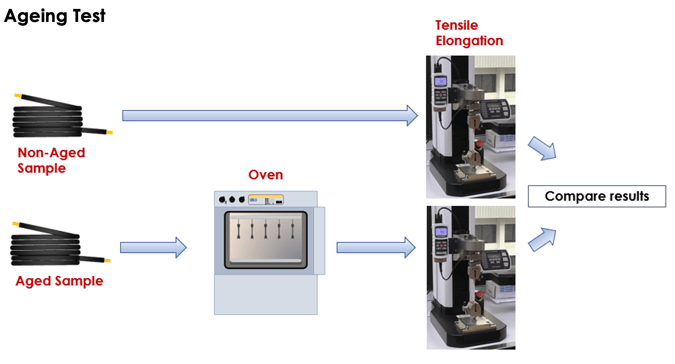What is the purpose of mechanical testing?
Power cables, typically installed underground, in ducts or on overhead structures, are often subjected to mechanical stresses such as tension, compression, bending and twisting. It is therefore important that cables are subjected to stringent tests to ensure their ability to withstand the mechanical stresses they will be exposed to during installation, operation and maintenance.
One of the categories that we test in mechanical testing is the tensile elongation test, which confirms that the manufactured cables are equipped with mechanical capabilities, including flexibility and endurance capabilities. By subjecting the cable insulation and jacket to a tensile elongation test, we can compare it to pre-determined minimum elongation and tensile strength based on standards to identify potential weaknesses in the cable design or materials to improve performance. This is essential to provide our customers with reliable cables.
Since the cables are meant to operate across a range The life span is 20 to 30 years Under normal use conditions, how can we ensure that cables continue to maintain mechanical integrity even after long-term use?
Tensile elongation test
We subject our cables to tensile elongation to determine if they can retain their tensile strength and elongation after being subjected to a tensile load. This rating determines a cable’s ability to maintain mechanical integrity at ambient temperatures, and is one of the key mechanical tests our cables need to withstand.

In this test, a tubular or dumbbell control specimen is prepared and placed in a two-clamp electromechanical or universal testing machine and pulled at each end to the breaking point. The test measures the amount of force (N) applied and the elongation at break of the specimen (∆L).
Tensile strength – amount of force (N):
The force required to pull on the cable material until it breaks. Maximum power it can withstand
Elongation(∆L):
The length over which the cable material can stretch until it breaks
The control sample is then used as a baseline and compared to an old sample that is placed in the oven and then subjected to a tensile elongation test. Read on to learn more about how cable samples age.
Samples aging conditions
To make sure the cables can maintain mechanical integrity Over a 20 to 30 year lifespan, we subject the materials to accelerated aging conditions to ensure that prolonged use does not negatively impact the cable. It is important to perform comparison tests with non-aged samples after the accelerated aging process.
To perform the aging test, the cable is placed in an oven to speed up the aging process, simulating decades of use. This is in line with IEC 60811- 401:2012 standards, which typically apply to crosslinkers and thermoplastics used in insulation and packaging materials in the kiln aging process. Samples placed in the oven are called aged samples.

The importance of testing
A successful result provides assurance that the cables will have a long and reliable service life, which is critical for the safe and efficient operation of electrical power systems, and reduced waste as a result of long cable life. If the cable is unable to withstand mechanical testing, it may lead to unsafe situations at project sites.
At Keystone Cable, mechanical testing is a standard component of our cable testing system. This is our assurance to you that our cables are reliable and adhere to international specifications.
For more information, please contact our sales team.



